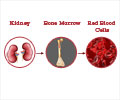Performance-enhancing EPO drugs might be missed out in ant-doping tests in the forthcoming Beijing Olympics, it is feared.
Recombinant human erythropoietin (EPO) is a genetically engineered version of the natural protein erythropoietin that increases the number of red blood cells. It is used to treat anemia from kidney disease, cancer and other ailments. But it is also taken as a performance-enhancing drug.The BBC says it has seen indications that laboratories of the World Anti-Doping Agency (WADA) are classing positive tests for EPO as negative.
Dr. Rasmus Damsgaard, running the anti-doping programme for the International Ski Federation says the current testing regime is fatally flawed.
The EPO urine analysis must show "EPO bands" that differ from the "natural bands" - the bands representing the hormone produced by the person's own body.
But these "natural bands" are usually non-existing when artificial EPO has been administered - a result of a decreased production of the body's own EPO.
That's the way the body works; when a drug is administered, the body puts its own production on a hold. The phenomenon is also known as "negative feedback".
Advertisement
Apart from discerning the “negative feedback,” the WADA has also to grapple with different kinds of EPs circulating in the blackmarket.
Advertisement
Tracking down and subsequently analysing all these different black market EPO types is impossible.
There is also concern that scientists in some WADA labs may be actively colluding with athletes or their medical advisers. Senior academics are currently investigating possible collusion between doctors who were working with cycling teams and WADA-accredited labs. They are worried that these doctors were gaining inside information on the latest test procedures.
Former professional cyclist Jorg Jacksche admitted that he had been a long-time doper when he was caught up in a drugs ring in Spain in 2006. He believes that collusion between labs and the doctors working with athletes is a fact of life.
There must have been also a certain knowledge exchange between cycling team doctors and persons that are working in the laboratories - otherwise how would they know?
Problems with the test have been raised earlier too. A Danish study, released last month, for instance had questioned the validity of testing for the EPO.
Urine sample testing didn't work, it was reported in the Journal of Applied Physiology.
In an editorial the journal had said the Danish results demonstrated that the test needed to be improved or a different strategy considered, noting that blood tests were an alternative.
"Testing for recombinant EPO in urine may seem practical at first sight but appears to be a very difficult task," wrote Dr. Joris Delanghe of Ghent University Hospital in Belgium and Dr. Michael Joyner of the Mayo Clinic in Rochester, Minnesota.
Experts want WADA to widen its criteria in declaring a positive, but Olivier Rabin, scientific director of the WADA, exudes confidence of detecting the cheats.
Only recently Italian rider Riccardo Ricco was fired by Saunier-Duval for testing positive for the banned blood-booster EPO during the Tour de France.
The "Cobra" - as Ricco is nicknamed - won two stages, but was thrown out of the race after failing a doping test Thursday last. He spent a night in a French jail and was fired by his Saunier Duval team the next day.
The head of France's anti-doping agency, Pierre Bordry that Ricco tested positive for CERA, or continuous erythropoietin receptor activator, an advanced version of the blood booster EPO.
Still not many are convinced. Athletes using EPO versions that the WADA labs are not aware of might get away with it in Beijing, experts fear.
Source-Medindia
GPL











